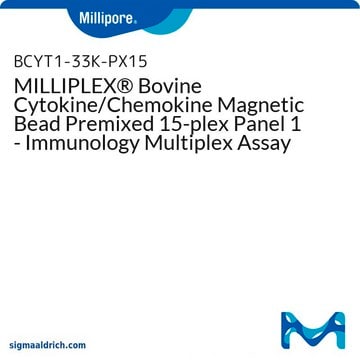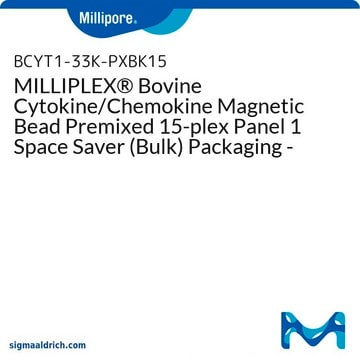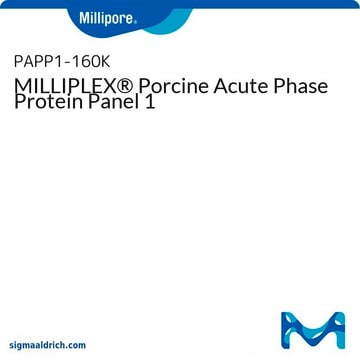PCYTMG-23K-13PX
MILLIPLEX® Porcine Cytokine/Chemokine Magnetic Bead Panel - Immunology Multiplex Assay
Simultaneously analyze multiple cytokine and chemokine biomarkers with Bead-Based Multiplex Assays using the Luminex technology, in porcine serum, plasma and cell culture samples.
Synonym(s):
luminex porcine cytokine chemokine growth factor multiplex assay, luminex porcine pro inflammatory anti inflammatory cytokine panel, millipore porcine inflammation multiplex kit, porcine interleukin immunoassay panel
About This Item
Recommended Products
Quality Level
species reactivity
pig
manufacturer/tradename
Milliplex®
assay range
accuracy: 92-103%
standard curve range: 0.005-20 ng/mL
(IL-1α)
standard curve range: 0.012-50 ng/mL
(IL-8)
standard curve range: 0.024-100 ng/mL
(GM-CSF, IL-1ra, IL-2, IL-6, IL-10, IL-12, IL-18 & TNFα)
standard curve range: 0.061-250 ng/mL
(IL-4)
standard curve range: 0.122-500 ng/mL
(IFNγ & IL-1β)
technique(s)
multiplexing: suitable
compatibility
configured for Premixed
detection method
fluorometric (Luminex xMAP)
shipped in
wet ice
General description
The MILLIPLEX® Porcine Cytokine/Chemokine Panel can be used for the simultaneous quantification of all the following analytes in porcine tissue/cell lysate and culture supernatant samples and serum or plasma samples: GM-CSF, IFNγ, IL-1α, IL-1ra, IL-1β, IL-2, IL-4, IL-6, IL-8, IL-10, IL-12, IL-18 and TNFα. This kit uses a 96-well format, contains a lyophilized standard cocktail, two internal assay quality controls and can measure up to 38 samples in duplicate.
The Luminex® xMAP® platform uses a magnetic bead immunoassay format for ideal speed and sensitivity to quantitate multiple analytes simultaneously, dramatically improving productivity while conserving valuable sample volume.
Panel Type: Cytokines/Chemokines
Specificity
Application
- Analytes: GM-CSF, IFNγ, IL-1α, IL-1β, IL-1Ra, IL-2, IL-4, IL-6, IL-8 (CXCL8), IL-10, IL-12, IL-18, TNF-α
- Recommended Sample Type: serum, plasma or cell/tissue culture supernatants or lysate
- Recommended Sample Dilution: 25 μL per well of undiluted serum or plasma; cell/tissue culture samples may require dilution in an appropriate control medium.
- NOTE: Extra centrifugation and attention may be needed for samples with extremely high lipid content.
- Assay Run Time: Overnight (16-18 hours) at 2-8°C.
- Research Category: Inflammation & Immunology
Packaging
Storage and Stability
Other Notes
Legal Information
Disclaimer
Signal Word
Danger
Hazard Statements
Precautionary Statements
Hazard Classifications
Acute Tox. 3 Dermal - Acute Tox. 4 Inhalation - Acute Tox. 4 Oral - Aquatic Chronic 2 - Eye Irrit. 2 - Skin Irrit. 2 - Skin Sens. 1
Storage Class Code
6.1C - Combustible acute toxic Cat.3 / toxic compounds or compounds which causing chronic effects
Certificates of Analysis (COA)
Search for Certificates of Analysis (COA) by entering the products Lot/Batch Number. Lot and Batch Numbers can be found on a product’s label following the words ‘Lot’ or ‘Batch’.
Already Own This Product?
Find documentation for the products that you have recently purchased in the Document Library.
Our team of scientists has experience in all areas of research including Life Science, Material Science, Chemical Synthesis, Chromatography, Analytical and many others.
Contact Technical Service









